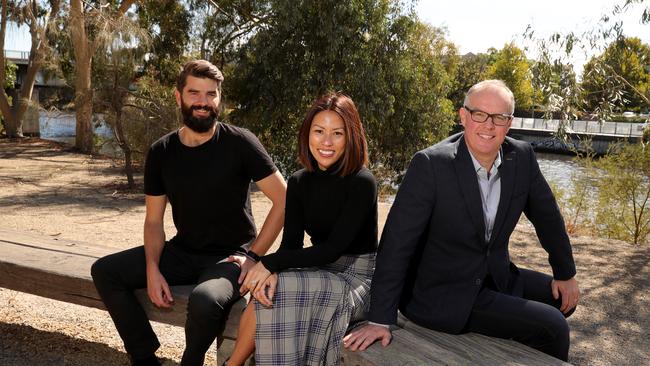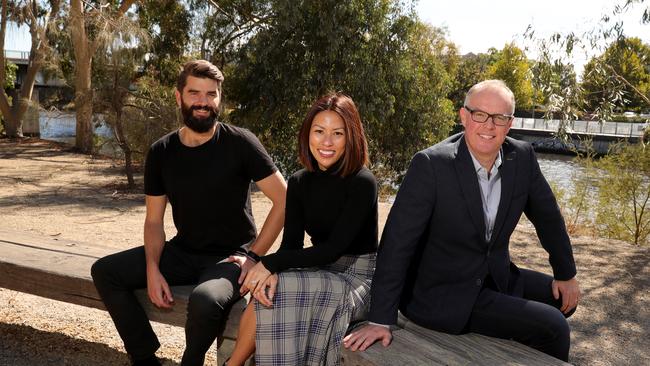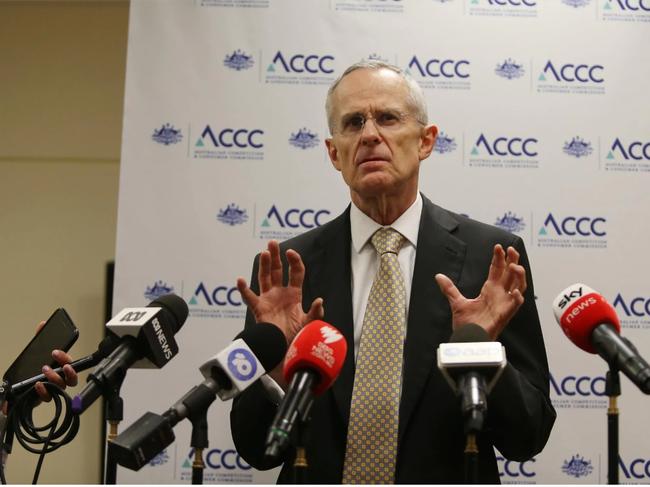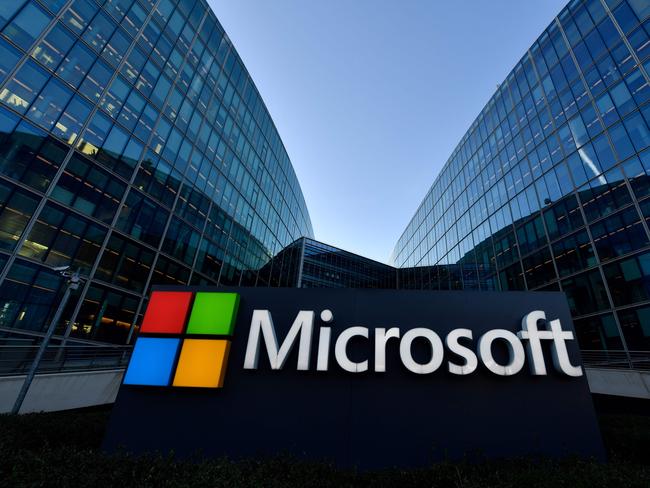Socialsuite lands $1.5m funding round
The tech start-up is busy plotting a significant US expansion.

Hello and welcome to The Download, The Australian’s technology blog for the latest tech news.
Chris Griffith 4.00pm: eftpos moves to undercut Visa and MasterCard
Debit card payments system eftpos says it could undercut merchant transaction fees by up to 40 per cent as it begins its push into the digital payments market.
eftpos today announced it had started to roll out digital payments solutions for businesses seeking potential savings in the COVID environment.
eftpos has been available in Australia since 1984, but only now is it moving into digital payments. The original implementation was swipe machine transactions. Tap transactions came in 2014, followed by mobile phone payments on Apple and Google smartphones in late 2016. (Samsung etfpos payments are on the way).
This first implementation doesn’t involve consumers using eftpos. Rather, it will involve merchant accounts. It means that when retailers and others pay for goods, they’ll have a substantially reduced transaction fee. Consumer e-commerce with eftpos will follow later.
eftpos chief executive Stephen Benton says dozens of Australian businesses are already using eftpos card-on-file payments, with tens of thousands of transactions being processed through the service each month.
He says almost 40 Australian banks are also supporting the service, enabling their cards to be processed by eftpos for card-on-file payments.
“eftpos is synonymous with low cost debit card payments in store at retailers across Australia, and we’re excited to start making headway in the digital payment space,” Mr Benton says.
“It is early days but the service will increasingly enable more small and medium businesses to have Australia’s most popular cards – multi-network debit cards – processed by eftpos, and potentially deliver significant cost savings. These potential savings are particularly important for small businesses during COVID-19 and recovery.”
Mr Benton cited Aussie Broadband and Cluey Learning as two early adopters.
David Swan3.10pm: Socialsuite lands $1.5m funding round
Social impact technology outfit Socialsuite has landed a $1.5m funding round, as it forges a new path into the US.
The company, which gathers feedback and sentiment to help companies grapple with social issues, landed the funding from investors including Australian-based Tidal Ventures and Salesforce Ventures.
Socialsuite chief executive Brad Gurrie said the funding would be used to bolster the company’s platform, and help the company push into the US.
Socialsuite supports more than 100 measurement methodologies on its marketplace that have been developed by third-party impact experts.
The company has grown its customer base 80 per cent year on year, with clients including Scope, Salvation Army and YMCA.
“The demand for Socialsuite has been growing over recent years but due to recent events, including bushfires in Australia, COVID-19 and rising social inequality movements, we have seen an exponential increase in demand,” Mr Gurrie said.

“With trillions of dollars flowing into social programs and demand for services increasing, there is a critical need for Socialsuite. This was illustrated in the midst of the coronavirus pandemic, when we launched the Free COVID-19 Social Impact Assessment. More than 1,000 organisations signed up in just a few weeks to monitor the social impact of COVID-19 on their people. The tool helps organisations to understand what help people might need with stress, resilience and loneliness. These key learnings have helped shape the launch of a ‘lite’ product that will address the needs of charities around the world.”
He added that Socialsuite is able to help not-for-profits to monitor the impact of their programs and report back to stakeholders.
“Since making our initial investment in Socialsuite, we have seen the team make significant progress in delivering a capable social impact measurement platform for local and international markets,” Wendell Keuneman, general partner at Tidal Ventures, said.
“Socialsuite’s growing collection of assessment methodologies provide relevant solutions addressing the community, corporate and environmental challenges we are facing globally.”
David Swan11.25am: Zebit bolsters board ahead of ASX listing
US buy now, pay later outfit Zebit has bolstered its board, as it races towards a planned ASX listing in September.
The company is focused on the growing proportion of the US population considered to be ‘credit challenged’, who live pay cheque to pay cheque, and CEO Marc Schneider said Zebit is the only company offering those customers a fair deal.
His e-commerce platform Zebit, which makes its money through the sale of household goods, has added Suncorp and Regis Healthcare director Sylvia Falzon to its board, as it eyes an ASX listing later this year.
Ms Falzon joins other board members including former PayPal president Scott Thompson, ex-deputy general counsel at Google Miriam Rivera and former FICO CEO Larry Rosenberger.
The company is looking to raise $US30m in an IPO to accelerate its North American growth, and has already raised around $US50m in venture capital funding.
Shaw and Partners are serving as the lead managers.
David Swan10.55am: Render cements US expansion with key fibre deals
An Australian start-up founded by a former NBN Co executive has sealed several major deals with construction partners that will see its technology leveraged in accelerating the rollout of fibre networks across the US.
Working with several major construction partners, including TBG, Irby Utilities, Centurylink, City Utilities of Springfield, Render Networks estimates the technology will be leveraged in connecting up to 300,000 homes in the US fibre rollout.
The start-up uses geospatial tracking and machine learning to track and streamline fibre rollouts, resulting in cost and time efficiencies of up to 50 per cent. It‘s currently involved in projects either underway or completed in two states, Arkansas and Missouri. New contracts in states including California, Tennessee, Mississippi, and Idaho, will effectively double the size of Render’s US rollout footprint.

Render CEO Sam Pratt said he estimates that to date his company is assisting in the deployment of $US400 million worth of telecommunications infrastructure.
“We’re thrilled with the substantial progress we are making in the US. We anticipate our US business will continue to grow significantly through to 2025,“ Mr Pratt said.
“The digital divide is acute in the US. The Federal Communications Commission says 21 million Americans lack high-speed internet access. With much of the country still in lockdown and families relying on the internet for work, healthcare and education, better connectivity becomes critical.
“Both state and federal governments are committed to underwriting the rollout, including US $20B in near-term funding and recently-announced stimulus packages. Secondly, US telecommunication and utility operators want to deliver these deployments as efficiently and cost-effectively as possible.
“Everything is lining up for Render to be part of the solution to this industry challenge. Render’s construction management technology is first-in-market to deliver end-to-end digital construction projects, synchronising geospatial data in real-time across all stakeholders to easily monitor progress and streamline Fibre-to-the-Home (FTTH) and wireless network rollouts.”
David Swan10.40am: Afterpay launches Europe push
Buy now, pay later market darling Afterpay is continuing its global push, this time expanding into the lucrative €300b1 ($494bn) European buy now, pay later market through the acquisition of Pagantis and PMT Technologies.
Fresh off forays into the UK, Canada and the US, Afterpay said it would now take on the likes of Spain, France, Italy and Portugal.
In a statement, Afterpay said its subsidiary Clearpay would acquire Spanish tech outfit Pagantis. Pagantis’ products will be rebranded to Clearpay, and legacy technology from Pagantis will be integrated to provide the Afterpay core product.
Afterpay CEO Anthony Eisen said the company’s growth in the UK and the US had been faster than anticipated.
9.00am: Twitter adds disclaimer to Trump tweet
Twitter has placed a disclaimer on US President Donald Trump’s tweet criticising the promotion of drop boxes by Democrats as an option for voters, saying the tweet violated the company’s “civic and election integrity” rules.

“So now the Democrats are using Mail Drop Boxes, which are a voter security disaster. Among other things, they make it possible for a person to vote multiple times. Also, who controls them, are they placed in Republican or Democrat areas? They are not Covid sanitised. A big fraud!” Trump said in a tweet posted on Sunday morning.
Twitter, in a disclaimer attached to the tweet, said: “Twitter has determined that it may be in the public’s interest for the tweet to remain accessible.”
Democrats across the country are promoting drop boxes as a convenient and reliable option for voters who do not want to entrust their ballots to the US Postal Service. Republican officials in other states have prevented their use.
Reuters
Chris Griffith 8.45am: Decision time for Google in Australia
The $US1 trillion valued Google is playing hardball with Australian media over demands it pays to use their content.

The Australian Competition and Consumer Commission (ACCC) has released a draft mandatory code that lets Australian media bargain with Google and fellow tech giant Facebook to secure fair payment for news content.
Comments on the code close on Friday and then its game-on. Either Google reaches agreement with Australian news companies or it may take its bat and ball and go home. Based on its behaviour in Spain in 2014 and other parts of Europe recently, there is a strong prospect that Google will walk away from any arrangement and opt not to display news organisations’ content in search. It could decide not to rank their stories or not show story excerpts.
You may think Google has the upper hand in this dispute, that with 90 per cent of the desktop search market and 98.21 per cent of the mobile search market, it can dictate to Australian media.
Experts say Google also has much to lose by walking away, and that there’s a viable plan B for Australian media if it does.
8:30am: Microsoft claims damage from Apple move against Fortnite
Microsoft says in a court filing that Apple’s threat to cut off the creator of “Fortnite” from Apple’s developer tools would hurt Microsoft’s gaming business, as well as other game developers.

The filing came in a dispute between Apple and Epic Games. Apple removed Epic’s titles from its App Store after the game maker violated the iPhone maker’s in-app payment rules.
Epic says that Apple has also threatened to cut off its access to Apple tools needed to maintain “Unreal Engine,” software that many game developers license to create better graphics. Microsoft said the move would hurt at least one of its own game titles called “Forza Street” that uses the engine for the iOS version of the game.
Kevin Gammill, Microsoft’s general manager of gaming developer experiences, said Microsoft has an “enterprise-wide” license to Unreal Engine and that Apple’s move would hamper it and other gaming firms’ ability to make games with the technology for Macs and iPhones.
“If Unreal Engine cannot support games for iOS or macOS, Microsoft would be required to choose between abandoning its customers and potential customers on the iOS and macOS platforms or choosing a different game engine when preparing to develop new games,” Gammill wrote.
Reuters


